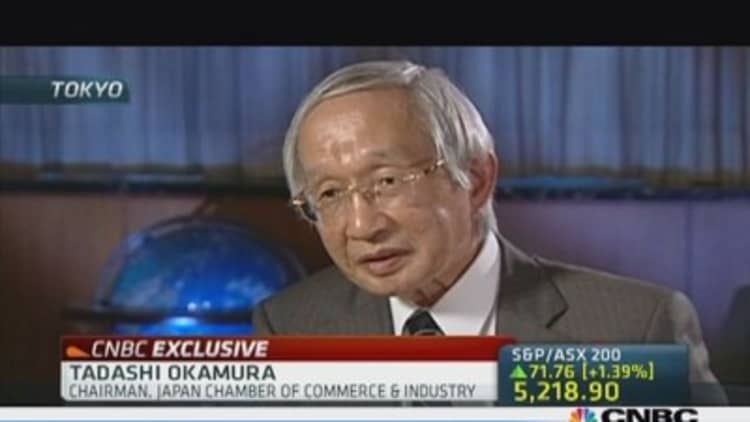
Japan hopes to cut its corporate tax rate to below 30 percent in stages over a few years starting in the next fiscal year, Japanese Prime Minister Shinzo Abe said on Friday.
Japan's corporate tax rate is almost 36 percent, lower than a rate of about 40 percent in the U.S. but still much higher than most developed countries. In Asia, Australia has a tax rate of about 30 percent for businesses, while in financial hubs Singapore and Hong Kong the levels are roughly 17 percent.
Read MoreIs Japan Inc ready to spend its cache of cash?
"The chances of a corporate tax cut in Japan are pretty high and also it's really important because the Abe government has identified a corporate tax cut as key to its growth strategy," said Junko Nishioka, chief Japan economist at RBS in Tokyo.
Abe, the architect of a policy to put the world's third-biggest economy back on track after almost two decades of deflation, argues cutting taxes for businesses is crucial to boosting corporate investment and encouraging Japan Inc to raise wages – a key ingredient to breaking a cycle of deflation.
"Japan's corporate tax rate will change into one that promotes (economic) growth," Abe was quoted saying by Reuters on Friday.
Critics argue that cutting taxes for corporates, who are already sitting on big cash piles, denies the government of much needed revenue to lower its public debt.
In short, the corporate tax debate could turn out to be as contentious as the decision to hike Japan's sales tax to 8 percent from 5 percent in April – the first tax hike in 17 years.

"Lowering the corporate tax rate could lead to a virtuous cycle ending in corporate investment and higher wages. So you recoup that tax cut in other forms of growth because generally the economy benefits," said Vishnu Varathan, market economist at Mizuho Corporate Bank.
"It would incentivize higher investments which is one thing Abenomics is trying to unlock – the huge cash reserves that corporates have," he added. "It would also create more incentives to optimize profits and allow smaller firms to gain competitiveness given that within Asia, corporate tax in Japan is relatively high."
Read MoreIs the Nikkei's rise just beginning?
Details of how much Tokyo will lower the corporate tax rate are expected to be unveiled in an economic package due later this month.
"The important thing is how much they will be able to reduce the tax rate by gaining other revenue from other sources," said Nishioka at RBS.
"It looks like they want to reduce the tax rate by as much as 10 percent, but if there is no other refinancing option this is impossible," she said, adding: "I think a reduction by 5 percent is reasonable for the time being."
Read MoreDeflation in Japan may finally be 'dead'
According to a report from Reuters, Abe has met resistance from his party's tax panel. It has called for assurances on how to fill the gap in tax revenue so that urgent fiscal reforms are not delayed.
"One thing is the natural recovery in the economy which is good for maintaining tax revenue but it's probably not enough," said Harumi Taguchi, principal economist at IHS Economics in Tokyo. "They may take away special tax treatments for some industries and also bring more companies into the tax pool."


